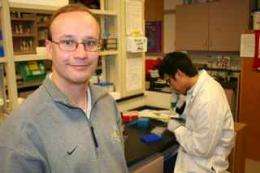SDSU researchers look for genes that affect vaccine response

(PhysOrg.com) -- South Dakota State University livestock research is trying to determine whether the genes cattle inherit help determine the way they respond to vaccinations.
The result could be new knowledge about how to make cattle herds healthier.
Assistant professor Michael Gonda in SDSU’s Department of Animal & Range Sciences is leading that study with assistance from graduate student researcher Xin Fang. Gonda is looking at individual genes and also the genome, or the entire system of genes carrying hereditary information.
The work has implications for other species besides cattle and could also add to the understanding of vaccine response in humans.
“It’s often assumed that animals, and humans as well, respond uniformly to a vaccine,” Gonda said. “In reality there’s a lot of variation in vaccine response. Some animals respond very well and very robustly to the vaccine, other animals don’t respond at all. In fact, there is a certain fraction of the population that simply does not respond to the vaccine. One of the goals of my laboratory is to determine how much of the non-response to vaccines, or differences in response to vaccination, is actually controlled by genetics, by the animal’s own genes.”
Researchers are vaccinating in total about 1,500 calves over a two- to three-year period. They’re using both animals at the SDSU campus as well as at some outlying SDSU research stations such as the Cottonwood Research Station and the Antelope Research Station in western South Dakota, and the SDSU Cow Camp in Miller. In addition the study uses a beef and a dairy research herd at North Carolina State, where some of Gonda’s collaborators work.
Scientists are vaccinating all these animals with a commercially available vaccine that protects against both types of Bovine Viral Diarrhea, or BVD. Twenty-five to 30 days later, researchers go back and measure how the animals have responded to the vaccine — whether the response is strong, moderate, low, or if they have not responded at all.
The scientists measure vaccine response by enzyme-linked immunosorbent assay, or ELISA, a technique that can detect the presence of antibodies produced by the animal’s immune system in response to the vaccination. Measuring these antibodies gives a good picture of how an animal responds to the vaccine.
“Our objective is once we get these vaccine response measurements, we want to determine, is vaccine response heritable? That means, is there a genetic component to vaccine response? And if there is, can we find any genes or any loci that are associated with vaccine response?” Gonda said. “We do have some preliminary data that suggest the vaccine response is heritable.”
If there is a genetic component to response to vaccination for BVD, it’s possible that the same genes would be involved, no matter what vaccine is being given. And it’s at least possible that a gene found to help regulate vaccine response in cattle could play an important role in vaccine response in other species of livestock or in humans.
Gonda and his colleagues are looking specifically at polymorphisms, or regions of genes where there are differences from animal to animal. Researchers are focusing on genes that are known to be important from an immunological standpoint such as the major histocompatability complex, a genomic region important to the immune system. They’re also studying the leptin gene, which is thought to have a role in regulating the immune system. A polymorphism within the leptin gene has already been shown to affect vaccine response to a rabies vaccine in cattle by researchers at the University of Saskatchewan.
Eventually, Gonda said, his research could look at the entire genome.
“One of the biggest applications of genomics is going to be to identify molecular markers within genomes that can be used to select for traits in livestock,” Gonda said. “One of the long-term goals of the studies that I’m doing is to identify molecular markers or genes that are associated with vaccine response so that perhaps one day livestock producers can go out and they can select animals that have favorable marker alleles for vaccine response and make their cattle healthier.”
Provided by South Dakota State University















